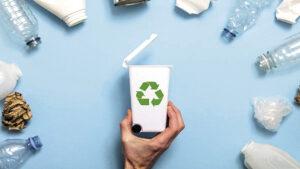Food contact materials and sustainability
Dr Blanka Daniella Szilvássy, food safety officer of the National Food Chain Safety Office (Nébih) has summarised the European Union’s review process about food contact materials (FCM), sustainability, and packaging materials for our magazine.
This article is available for reading in Trade magazin 2024/8-9

Dr. Blanka Daniella Szilvássy
food safety officer
Nébih
Packaging material in itself helps us to be sustainable by protecting our food from going bad prematurely – this way less food is wasted. In addition to this, the sustainability of the production of FCMs and packaging materials also need to be studied, as achieving the UN Sustainable Development Goals (SDG) is one of the EU’s key objectives. If the European Commission introduces sustainability into its FCM requirements based on the SDGs, it should also ensure coherence with other EU policies, including the circular economy and the Farm to Fork (F2F) strategy.
Pillars
The European Commission decided on the review of the Food Contact standards back in 2020, and since then there have been numerous studies, questionnaires and consultations. The ongoing review process is structured around six “pillars”, the first four of which include – besides the sustainability aspect – a shift of emphasis to the finished product, better prioritisation of materials, and improvements in analytical methods. As for the sustainability pillar, it seeks to increase the sustainability of FCM and food product manufacture and use, including reuse and recycling –“sustainable FCM”.

A Food Contact előírások felülvizsgálatáról már 2020-ban döntött az Európai Bizottság
Legislation, directives
Currently the European Commission is working on the implementation of various initiatives aimed at achieving a circular economy, reducing food waste and developing sustainable food systems. In particular the proposal for a Packaging and Packaging Waste Regulation (PPWR) and the new Ecodesign for Sustainable Products Regulation (ERSP) will play a key role in improving the circularity and promoting sustainable options for products generally covered by FCM legislation. In the area of food packaging two initiatives have been launched to directly address consumer waste: the proposal for a Single-Use Plastics Directive (SUP) and the PPWR proposal. The SUP Directive has introduced a number of measures, in particular to reduce waste production. Specific targets include reaching a 77% proportion for the selective collection of plastic bottles by 2025 and 90% by 2029, and a 25% target for recycled plastic in PET bottles from 2025 and 30% in all plastic beverage bottles from 2030. //
Priorities
In order to achieve “sustainable FCM”, the European Commission will focus on the following priorities.
1. General understanding of sustainability in the context of FCMs and addressing it effectively in FCM legislation.
2. Achieving the following goals without compromising food safety:
a) Sustainable FCM production
b) Sustainable use, reuse, recycling and disposal of FCMs
c) Using FCMs to contribute to the sustainable production, distribution and consumption of food
3. Identifying and detailing regulatory and non-regulatory policy measures that can achieve these objectives.
4. Understanding the scope of each policy measure for the whole FCM market. //
Related news
dm welcomes customers with stable prices and a superb price-value ratio
🎧 Hallgasd a cikket: Lejátszás Szünet Folytatás Leállítás Nyelv: Auto…
Read more >ESG: the majority don’t ask for postponement, preparedness level is increasing
🎧 Hallgasd a cikket: Lejátszás Szünet Folytatás Leállítás Nyelv: Auto…
Read more >2026: stricter EU rules and digital waste tracking
🎧 Hallgasd a cikket: Lejátszás Szünet Folytatás Leállítás Nyelv: Auto…
Read more >Related news
How Coca-Cola plans to build more billion-dollar brands
🎧 Hallgasd a cikket: Lejátszás Szünet Folytatás Leállítás Nyelv: Auto…
Read more >Tesco sets out store expansion plans in 2026 including five former Amazon Fresh sites
🎧 Hallgasd a cikket: Lejátszás Szünet Folytatás Leállítás Nyelv: Auto…
Read more >








